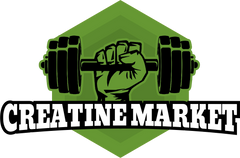The timing of creatine supplementation remains a hot topic in the fitness and nutrition community. While some advocate for taking creatine on an empty stomach for faster absorption, others suggest pairing it with meals for optimal results. Let's dive into the science behind creatine timing and settle this debate with evidence-based insights.
Understanding Creatine Absorption
Creatine supplementation has become increasingly popular among athletes and fitness enthusiasts, but understanding how our bodies absorb and utilize this compound is crucial for maximizing its benefits.
When you consume creatine, it travels through your digestive system and enters your bloodstream through specialized transporters in your intestinal cells. These transporters, particularly the CreaT1 transporter, play a vital role in how effectively your body utilizes the supplement.
Research indicates that these transporters function regardless of whether your stomach is empty or full, but certain factors can influence their efficiency.
Taking Creatine on an Empty Stomach: Pros and Cons
Potential Benefits
Taking creatine on an empty stomach offers several potential advantages:
Faster absorption rates due to reduced competition with other nutrients. Direct exposure to intestinal transporters without interference from other food components. Convenience and flexibility in timing, especially for early morning workouts.
Possible Drawbacks
However, consuming creatine on an empty stomach isn't without its challenges:
Some users report mild gastrointestinal discomfort or nausea. Potentially reduced absorption rates without the insulin response triggered by food. Possible faster transit time through the digestive system, which might affect absorption.
The Role of Insulin in Creatine Absorption
Understanding the Insulin Connection
Insulin plays a significant role in creatine uptake by muscle cells. When you consume carbohydrates or protein, your body releases insulin, which can enhance creatine transport into muscle tissue.
The Timing Strategy
This insulin response has led many experts to recommend taking creatine with meals, particularly those containing:
Complex carbohydrates that provide a sustained insulin response. High-quality proteins that support muscle protein synthesis. A combination of both macronutrients for optimal absorption conditions.
Nutritional Strategies for Creatine Loading
The initial loading phase of creatine requires specific nutritional support to maximize muscle saturation and performance benefits. Increased carbohydrate intake helps shuttle creatine into muscle cells, while proper protein balance maintains an anabolic environment. Strategic meal timing during loading maximizes muscular saturation rates, with research suggesting 4-5 evenly spaced doses throughout the day. Clinical studies demonstrate that maintaining a surplus of 300-500 calories during the loading phase can enhance creatine retention and muscle glycogen storage.
Recent research indicates that consuming 50-100g of high-glycemic carbohydrates with each creatine dose significantly improves uptake efficiency. Additionally, maintaining protein intake at 2.0-2.4g per kg of body weight during loading helps support the increased training volume that creatine enables. Proper hydration becomes especially crucial during this phase, with recommendations suggesting an additional 500-1000ml of water daily to support cellular volumization.
Optimal Timing Strategies
Pre-Workout Considerations
If you're planning to take creatine before exercise, timing becomes particularly important:
Taking it 30-60 minutes before training allows for adequate absorption. Consider your individual tolerance and any stomach sensitivity. Factor in your meal timing to avoid potential discomfort during exercise.
Post-Workout Window
The post-workout period presents another opportunity for creatine supplementation:
Muscle cells may be more receptive to nutrient uptake after exercise. The natural insulin response to post-workout nutrition can support creatine absorption. Recovery nutrients can work synergistically with creatine for better results.
Best Practices for Creatine Supplementation
Dosage Recommendations
Regardless of timing, proper dosage remains crucial:\
Standard maintenance dose: 3-5 grams daily. Loading phase (optional): 20 grams daily for 5-7 days, split into 4 doses. Consider body weight and activity level when determining optimal dosage.
Hydration Requirements
Proper hydration enhances creatine effectiveness:
Aim for 8-10 glasses of water daily when supplementing with creatine. Monitor hydration status, especially during the loading phase. Consider electrolyte balance for optimal cellular hydration.
Special Considerations
Individual Variations
Personal factors can influence optimal creatine timing:
Genetic differences in creatine transport efficiency. Individual digestive tolerance and sensitivity. Training schedule and daily routine considerations.
Different Forms of Creatine
Various creatine forms may affect absorption differently:
Creatine monohydrate remains the most studied and reliable form. Micronized versions might cause less digestive discomfort. Novel forms may have different absorption characteristics.
Maximizing Creatine Benefits
Consistency Over Timing
While timing can influence results, consistency proves more important:
Daily supplementation maintains optimal muscle creatine levels. Regular intake patterns support better adherence. Focus on establishing a sustainable routine that works for you.
Practical Implementation
Creating Your Supplementation Schedule
Develop a personalized approach based on:
Your daily schedule and meal timing. Training routine and recovery needs. Personal preference and tolerance.
Common Mistakes to Avoid
Supplementation Errors
Be aware of these common pitfalls:
Irregular supplementation patterns. Inadequate hydration during supplementation. Overlooking the importance of proper nutrition alongside supplementation.
Conclusion
While taking creatine on an empty stomach is generally safe and can be effective, the research suggests that consuming it with meals or post-workout nutrition might optimize its benefits.
The most important factor remains consistency in supplementation rather than perfect timing. Focus on finding a sustainable routine that works with your schedule and supports your fitness goals.




